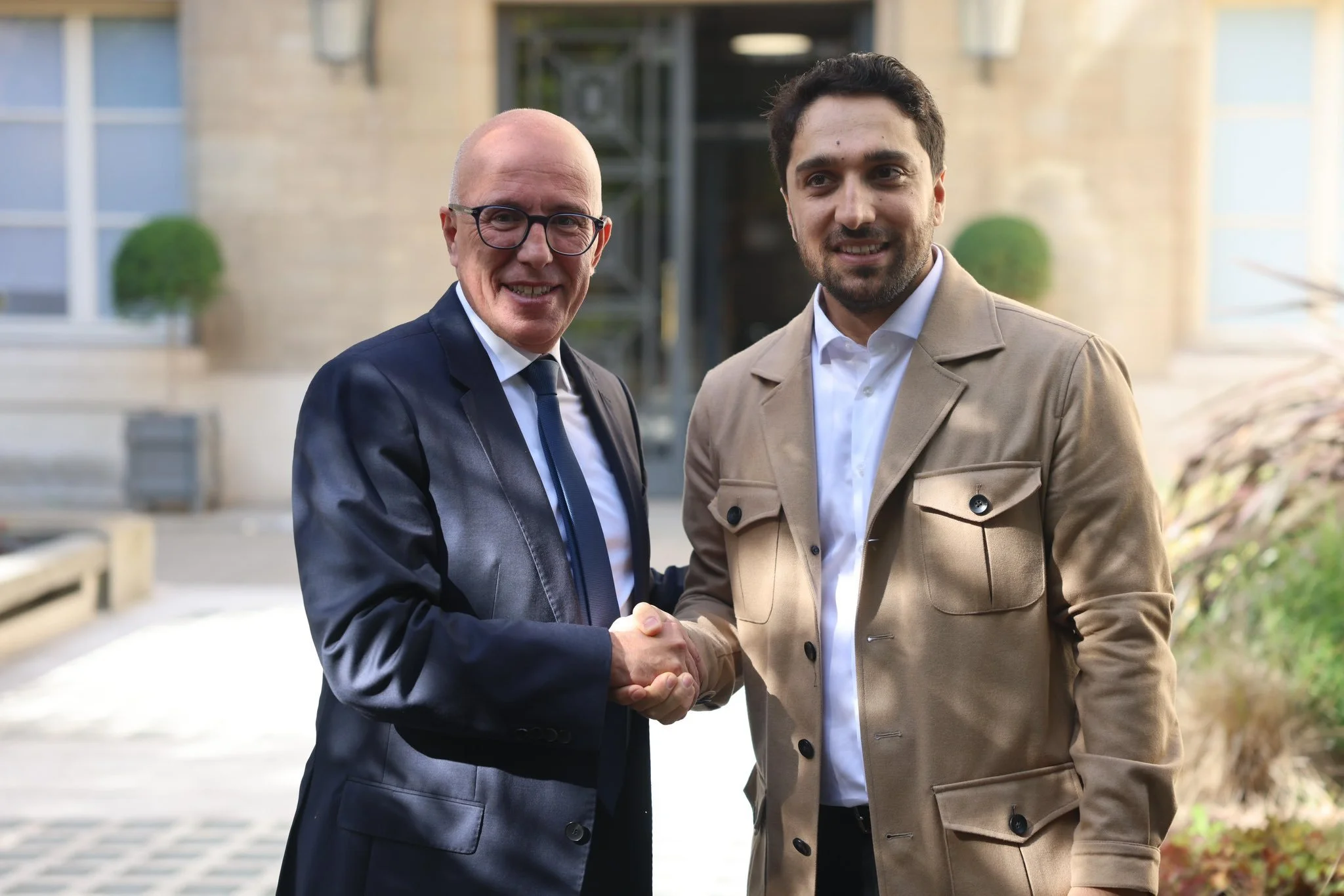NRF Leader Advocates for Afghanistan's Freedom in Historic France Visit
French MP Eric Ciotti with NRF Leader, Ahmad Massoud
By MAHER SAADAT | September 27, 2023 | maher@wearenrf.org | @SaadatMaher
In late September 2023, the leader of the National Resistance Front (NRF) of Afghanistan traveled to Paris, France. During his visit on Wednesday, September 27, he engaged with numerous French politicians, including the leader of the French Republican Party and the mayor of Paris. All expressed their support for the NRF's pursuit of freedom against the Taliban occupation.
During his stay, Commander Ahmad Massoud is expected to participate in the book launch of "Our Freedom" on September 29, co-authored with French writer Olivier Weber. The book explores Commander Ahmad Massoud's life, his resistance journey, and his perspectives on Afghanistan, human rights, and moderate Islam. It also shares previously untold stories about the late Commander Ahmad Shah Massoud, Afghanistan’s National Hero.
In addition to his official engagements, Commander Ahmad Massoud discussed the book and the current state of affairs in Afghanistan with France Inter.
“Don't forget Afghanistan!”
“The son of Commander Massoud, in Paris for the release of his book "Our Freedom", aspires to take up the mantle of his father, who was assassinated by Al-Qaeda two days before the 9/11 attacks in the United States. This time, the enemy is not the Red Army, but the Taliban. At 34, Ahmad Massoud has no military experience, but he wishes to follow in the footsteps of his father, the legendary Commander Massoud, who was at the forefront of the fight against Soviet occupation. Since the fall of Kabul on August 15, 2021, the Taliban have imposed a dark reign over the population. Ahmad Massoud wants to represent the fight against religious fanaticism.”
“What message do you want to convey through your book?”
AHMAD MASSOUD: "I am here to amplify the voice of my people. We are alone and live under the oppression of the Taliban who terrorize us. I was in Kabul during its fall. France offered to evacuate me, but I chose to stay with the people and not abandon them."
Today, Afghanistan is living a nightmare. How do you see your role?
"We must be clear: Afghanistan is under the occupation of the Taliban, much like France was occupied by the Nazis. The problem is that the world says: it's just the reality. It's as if back then, people said, 'Oh, you know, the Nazis, they're just a reality!' That's what I'm told. We need the world to stand against this tyranny, against terrorism and extremism, against these people who forbid girls from attending school."
Do you feel that the international community is forgetting Afghanistan?
"It's easy to sweep the dust under the rug, to push Afghanistan's problems aside, but they don’t just vanish! When my father came to France in 2001, he said: 'Don't forget Afghanistan!' And that's what happened. Today, I have to say it again: Don't forget Afghanistan. Otherwise, there will be consequences."
Do you believe the Taliban have changed since coming to power?
"I believe that for the past two years, we all agree: the Taliban haven't changed. Neither their ideology nor their behavior. Their ties with terrorist groups remain the same. They aim to establish more Madrassa’s, more terrorism, and more extremism. In fact, they hold the people hostage by force."
What's the situation in the Panjshir Valley where you come from?
"We resist in a few valleys and mountains. It should be noted that the Taliban have deployed at least 16,000 fighters in the area. They try to hold the territory, but it's untenable because deep down, they can't control us. They control the main valleys, but the rest is in our hands."
How do you envision the scenario of liberation? An uprising from within?
"We have forces on the ground, but we need some form of unity from the outside. The democratic world must stand alongside Afghanistan’s democrat forces. We need external support. But I must tell you, people's fear of the Taliban is diminishing. No group foreign to Afghanistan can rule this country for long."
What are your requests for external assistance?
"I never asked foreign countries to come to Afghanistan in 2001, and the same goes for today. Because that was a mistake. I was against the American policy of 'boots on the ground'. Why choose between military intervention or forgetting Afghanistan? If we get help, we can liberate our country. We need sanctions, political support for the opposition, and ways to create a political process. We must also mobilize regional countries. I believe there is more room for change now than there was two or three years ago."

